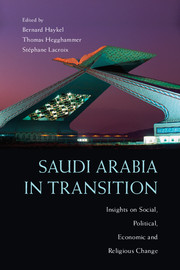14 - Caught between Religion and State
Women in Saudi Arabia
Published online by Cambridge University Press: 05 January 2015
Summary
Ilbis baraq’ thul wa ibi niswan
Ibid an al-islah ihthar wujudi
al-Hrayri, “Karamkum Allah Saudi”
Wear the burqa and the female abaya
Get off reform and beware of my existence
al-Hrayri, “May God respect you, He is a Saudi”’
Like many states in the Arab world and elsewhere, Saudi Arabia is undoubtedly a masculine state. Men control the political, economic, cultural, religious, and social institutions. They formulate visions about development, articulate policy, and deliver services to the constituency. Yet women are not totally absent from the state’s legitimacy narrative; in fact, they constitute an important aspect of its civic myth. Women are, indeed, prominent in the historical and contemporary imagination of the masculine state; they are depicted as needing to be protected, controlled, and guided within an authoritarian, paternalistic, and protective framework, lest they undermine the masculinity of the state and threaten the integrity of its morality. Services brought about by modernity – education, health, employment, and justice – are delivered to women via men, but only after they have been tailored to suit women’s needs, as defined and articulated by the state. The state considers it fundamental that the education system produces generations of females who are socialized to play the roles expected of them. Women work as teachers, doctors, nurses, and social workers – professions that underline their status as caregivers and support workers, which are seen as acceptable roles for women. More recently, some female entrepreneurs, scientists, literary figures, and media specialists have been allowed to enter the public sphere, but this remains dependent on the approval of men.
- Type
- Chapter
- Information
- Saudi Arabia in TransitionInsights on Social, Political, Economic and Religious Change, pp. 292 - 313Publisher: Cambridge University PressPrint publication year: 2015
References
- 2
- Cited by



